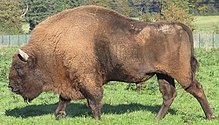Acnestis
Acnestis , also known as acnestis , is a historical medical term with various meanings. It is derived from the late Latin acnestis from ancient Greek ἄκνηστις áknēstis "backbone". This word can be traced back to a verb meaning "scrape, rub, scratch, itch".
The term was introduced into the specialist literature in the middle of the 18th century by the English physician Robert James (1703 to 1776), but is only used very rarely today.
meaning

In the anatomical description of living beings, Acnestis stands for that part of the back where the two shoulder blades meet in animals . Many mammals can not reach this area with their extremities if they itch ; that's why quadrupeds like to be scratched there (on the withers ).
In English , Acnestis describes the area between the shoulder blades on the human back. This part of the body cannot or can only be reached with difficulty by the human finger. So here you ca n't scratch yourself ; that's why there are back scratches . Because you can't wash yourself there, there are back brushes (terry toweling brushes).
There are similar devices for farm animals and pets, for example scrubbing posts or mechanical scrubbing brushes for self-service.
Word origin
While the word ἄκνηστις áknēstis itself is documented, the exact derivation is unclear. There are several etymological attempts to explain it:
- directly from the verb -κναίειν -knaíein "scrape, rub, scratch, itch" (only attested in connections; in Attic , however, the variant κνῆν knēn is proven and in Herodotus κνᾶν knān ) with Alpha privativum ἀ- a- , together with the meaning " not scratching ”;
- from κνῆστις knḗstis “spine; Schabmesser "(this in turn is derived from the verb) with reinforcing alpha intensum ;
- or also as a derivation from κνῆστις knḗstis , but through incorrect segmentation from κατὰ κνῆστιν katà knḗstin "on the back" (see Homer, Odyssey 10,161) to κατ 'ἄκνηστιν kat' áknēstin ; such a mistake may have been facilitated by the practice of scriptio continua .
Individual evidence
- ↑ a b c Acnestis . In: Oxford Living Dictionaries
- ↑ Joseph Meyer (Ed.): Meyer's Konversationslexikon - The large conversation dictionary for the educated classes . tape 1 .. Bibliographical Institute, Hildburghausen 1840, p. 620 ( limited preview in Google Book search).
- ↑ C. Strahlheim (Ed.): The General Lexicon or complete dictionary of all human knowledge . tape 1 .. Expedition of the General Lexicon, Frankfurt am Main 1836 ( limited preview in the Google book search).
- ↑ a b Acnestis . In: Ludwig A. Kraus: Critical-etymological medical lexicon, or explanation of the origin of the art expressions taken up especially from the Greek in the Medicin ... Deuerlich, 2nd edition 1826. ( books.google.de )
- ↑ Acnestis in the dictionary at Merriam-Webster
- ^ Johann Georg Krünitz : Economic Encyclopedia . Volume 7, p. 409.
- ↑ a b Hjalmar Frisk : Greek Etymological Dictionary , keyword -κναίω (Caution, 7.5 MB!)
- ↑ Greek Wikisource: Οδύσσεια , verse 10,161
- ↑ Hjalmar Frisk : Greek Etymological Dictionary , keyword ἄκνηστις (Caution, 7.5 MB!)
- ^ Wilhelm Pape : Concise dictionary of the Greek language , keyword ἄ-κνηστις
